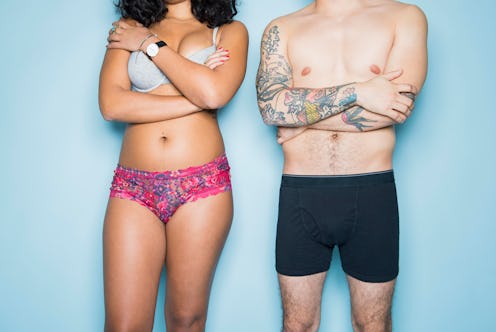Life
Why I Don't Say I "Lost" My Virginity

Even before I’d been exposed to the idea that our cultural conception of virginity is, well, flawed, I stopped saying that I “lost” my virginity. The decision to have intercourse with my high school boyfriend was something that we did after a lot of thought, consideration, and at least one trip to Planned Parenthood to get me on the Pill. We didn’t fall into bed and accidentally wake up de-virginized. I told him on a chilly May night on the shore of Lake Champlain that I loved him and wanted to have sex with him (all in one breath; poor kid) and we didn’t even do it until August.
In those intervening months, I talked with my parents about my decision; talked with my friends; over-talked it with my boyfriend. I — like a lot of teenagers — put a lot of weight on that one sex act, even though we’d been having oral sex and other kinds of sexual contact for months already. Virginity, though, was defined by the fact that his penis hadn’t gone into my vagina. Once that magical thing happened, everything was supposed to change.
And to be fair, things did change once we finally had PiV sex — but I wasn’t like, transformed into a different person by his penis. We grew even closer than we had been before and there was a certain, I don’t know, bond between us. It’s not that I think sex is insignificant — hell, I think it’s so significant that I spend a very, very large portion of my life writing, reading, and talking about it — but that I think the whole idea of “losing” your “virginity” is messed up in so many ways that speak directly to how sex negative our culture is, especially around teenage sexuality. Here are four reasons why I’ve dropped the phrase “lost my virginity” from my vocabulary.
1. It Wasn’t An Accident
An accident is something you don’t mean to happen and usually it’s not something you’re particularly pumped about. Having intercourse for the first time, on the other hand, was something I absolutely meant to do and something I was really happy and excited about. Therefore, saying I “lost my virginity” just doesn’t really jive with my lived experience.
2. I Know Exactly Where It Went
My virginity wasn’t lost. It was very consciously disposed of and I didn’t miss it when it was gone.
3. I Have A Broader Idea Of “Virginity” Now
While 15-year-old me knew that being a “virgin” specifically referred to people who hadn’t yet experienced the sex act of a penis going into a vagina for the first time, 29-year-old me sees how flawed that definition is. First of all, if heterosexual intercourse is the only “real” sex, then what about all of my gay friends who have never had sex with an opposite sex partner? Are they all “virgins?” (Answer: Definitely not.) Also, what about all of those other sex acts I was doing, like oral and mutual masturbation? And do I really think that my friends who were having anal sex but not penis in vagina sex were still virgins? (Nope.)
I like the idea of multiple virginities marking the first time you do a range of sex acts because even though I’m not down with this monumental value put on the first time people have heterosexual vaginal intercourse, that doesn’t mean I don’t think firsts are important! Treating virginity as a multi-step thing or as a plural event instead of a single moment where a penis goes in a vagina means we take the huge, huge pressure off of that one event. It also means we can celebrate our oral virginity; our kissing virginity; our anal virginity… You get the idea.
4. It Enforces The Idea That Worth Is Tied To Limited Sexual Experience
Our current concept of virginity being a valuable thing that is “lost” instead of “given” or “slowly whittled away” is directly linked to the idea that women who haven’t had sex are inherently more valuable than those who have. While that idea has certainly transformed in the past fifty years — virgin stigma is actually a thing now — we still judge women more for having sex than we judge men. By putting virginity up on a pedestal, we’re reinforcing the idea that women who are far, far from the time that they first had sex are somehow less valuable than those who haven’t done it yet.
Want more of Bustle's Sex and Relationships coverage? Check out our video on sex positions for small penises:
Images: Andrew Zaeh/Bustle; Giphy (4)